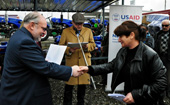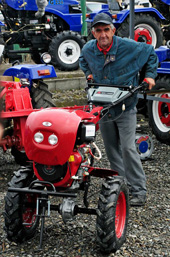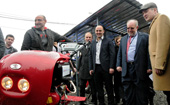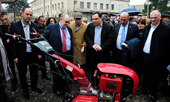
Job creation and income generation for vulnerable households
By Tatia Megeneishvili
Monday, March 10
On March 7, USAID distributed rot tillers and related land cultivation accessories as part of the agricultural mechanization livelihood packages to 88 vulnerable beneficiaries from Gori, Kareli and Khashuri municipalities. The event took place at the Agro technical Supplies Store in Gori.
The event was attended by USAID Mission Director Stephen M. Haykin, Governor of Shida Kartli Zurab Rusishvili, the heads of municipal administrations and local community representatives.
“I am pleased that USAID has another opportunity today to demonstrate our support to enhance economic growth and regional stability in the Shida Kartli region of Georgia. Today we are here to witness the results of one more important initiative undertaken by USAID’s New Economic Opportunities Initiative aimed at improving income generation opportunities for vulnerable rural households through a combination of capacity-building activities and in-kind grants,” Haykin stated.
In April 2013, USAID’s New Economic Opportunities (NEO) Initiative in partnership with the Civil Development Agency (CiDA) started supporting job creation and income generation programs for vulnerable households in the Shida Kartli and Mtskheta-Mtianeti Regions. NEO’s technical assistance is aimed at elevating vulnerable groups to subsistence levels through a combination of capacity-building activities and in-kind grants aimed at increasing employment opportunities, strengthening business skills, and improving agricultural production through the use of modern farming methods and equipment.
According to the Community Mobilizer of CiDA Revaz Barbakadze, over the past year CiDA has supported 142 vulnerable households in NEO-target communities in Shida Kartli to facilitate a sustained increase of at least 15 percent in the average value of household production in agriculture, service and trade initiatives.
Governor of Gori Papuna Koberidze said that this is not the first time that USAID has carried out such a share. “This is very good work, they are helping people and the municipality of Gori will do its best to support them in supporting people,” Koberidze told The Messenger.
USAID/NEO works in collaboration with 35 communities in Shida Kartli to develop community-level economic development plans that identify promising economic sectors, prioritize infrastructure projects, facilitate public-private dialogue, and leverage additional investments for the communities’ priority projects. To-date in the Shida Kartli region, NEO has implemented 20 infrastructure projects, including the rehabilitation of water supply systems, drainage channels, rural roads, and a public square. Over the next year, NEO plans to support an additional 15 infrastructure projects in communities across Gori, Kareli and Khashuri municipalities. Moreover, NEO implemented numerous agricultural value chain development initiatives across Shida Kartli. NEO has also provided 181 vulnerable individuals from NEO-target communities with access to USAID-funded vocational training programs that have resulted in employment opportunities for 85 percent of the programs’ graduates.
At the end of the event, USAID Mission Director symbolically passed presents to 7 beneficiaries, one of whom was Mzia Lukashvili from Village Khidistavi. Later Lukashvili told The Messenger that this is not the first time her village received assistance. “Not long ago, they fixed the road in our village. Before that, even emergency cars could not reach us, we are really very grateful to them,” Lukashvili said.
NEO is funded by the US Government through USAID to help Georgians access economic markets, attract investment, identify and implement economically beneficial infrastructural projects. The project will benefit at least 70,000 rural and vulnerable households in 10 municipalities: Dusheti, Kazbegi, Kareli, Gori, Khashuri, Oni, Tsageri, Lentekhi, Zugdidi, and Tsalenjikha. The project will foster sustainable poverty reduction, improved living standards for vulnerable populations, including IDPs, and increased local government participation in addressing community needs. Through the NEO project and others, the U.S. Government supports sustainable and inclusive economic growth that benefits all Georgians.




